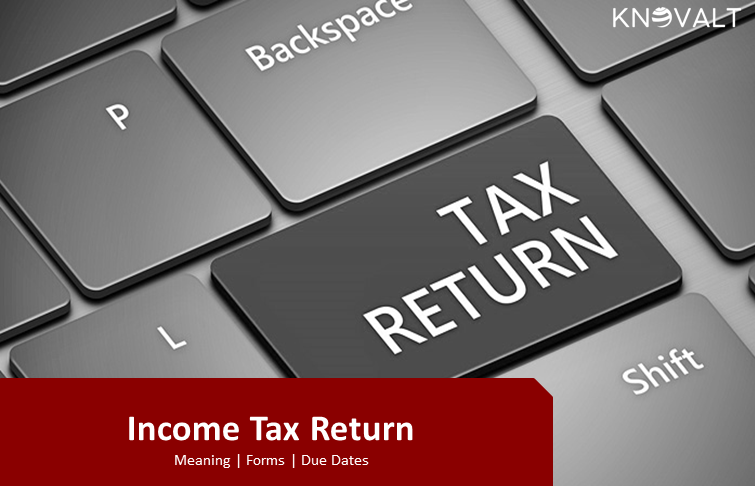-
AuthorTeam Knovalt
-
Comments0 Comments
-
Category
1,639 total views
Income Tax is a tax paid to the government for the development of our nation in respect of Infrastructure Developments; or any other medical facilities; necessities from the income earned by us. It is a kind of expense we pay to live in the civilized society. There is a prescribed limit of income on which Government of India charges tax. Income Tax returns are required to be filed with the tax authorities to provide them with the detail of the income earned and taxes paid in a year. Income tax return is a document in which details regarding income earned, expenses incurred, savings and investment made and calculation of Income Tax payable are furnished to the Income Tax Department. These details are used by the government to assess the amount of Income Tax collected and to calculate the GDP and Development Rate of the Nation. The Income Tax Act, 1961 contains the provisions related to Income tax and Returns to be filed.
Besides paying taxes, it is mandatory for an assessee (for some, irrespective of profits or losses) to file a Return of Income, which is a document specifying the thorough details regarding the incomes earned along with the eligibility of deductions if any, under Chapter VI of the Act.
Every person is required to file an ITR, elaborated as follows:
| S.No | Particulars | Details |
| 1 | INDIVIDUAL/HUF/AOP/BOI/ARTIFICIAL JURIDICAL PERSON: |
AOP stands for Association of Persons and BOI stands for Body of Individuals, which refers an entity or unit of assessment. It means two or more persons who join for a common purpose with a view to earn income; An Artificial Judicial Person refers to entity (such as a firm) other than a natural person (human being) created by law and recognized as a legal entity having distinct identity, legal personality, and duties and rights. Also called artificial person, juridical entity, juristic person, or legal person. File the return of income, if his total income (including income of any other person in respect of which he is assessable) without giving effect to the provisions of section 10(38) stating Long Term Capital Gain on transfer of shares and securities covered under Security Transaction Tax (STT), 10A, 10B or 10BA or Chapter VIA (i.e., deduction under section 80C to 80U), exceeds the exemption limit as specified in Income Tax Act, 1961 and amendments thereafter. |
| 2 | COMPANIES: |
Company has to compulsorily file an ITR irrespective of profits or losses in the financial year. |
| 3 | PARTNERSHIP FIRMS: |
Every person, being a partnership firm (including Limited Liability Partnership), has to file its return of income compulsorily, irrespective of its income being profit or loss. |
| 4 | CHARITABLE OR RELIGIOUS TRUSTS: |
Every person in receipt of income derived from property held under charitable or religious trusts/legal obligations or in receipt of income being voluntary contributions referred to in section 2(24)(iia), has to file the return of income if its total income exceeds the prescribed limit. |
| 5 | POLITICAL PARTIES: |
The Chief Executive Officer of every political party has to file the return of income of the party if the total income of the party without giving effect to the provisions of section 13A exceeds the maximum amount not chargeable to income-tax. |
DUE DATES FOR FILING RETURNS
As per the Act, every assessee has a provided Due Date for filing of the Returns of Income, which is shown as under:
| S.No. | Status of the taxpayer | Due date |
| 1 | Any company other than a company who is required to furnish a report in Form No. 3CEB[i] under section 92E | September 30 of the assessment year |
| 2 | Any person (may be corporate/non- corporate) who is required to furnish a report in Form No. 3CEB under section 92E | November 30 of the assessment year |
| 3 | Any person (other than a company) whose accounts are to be audited under the Income-tax Law or under any other law | September 30 of the assessment year |
| 4 | A working partner of a firm whose accounts are required to be audited under this Act or under any other law. | September 30 of the assessment year |
| 5 | Any other assessee such as Individual/ HUF. | July 31 of the assessment year |
Form No. 3CEB is a report from an accountant to be furnished under section 92E relating to the international transaction(s) and specified domestic transaction(s).
TYPES OF RETURNS
Certain legal provisions are specified in the Income Tax Act for filing returns, which are stated as follows:
REVISION OF RETURNS – SECTION 139(5)
The Act gives the assessee an opportunity to revise its return if it contains any errors or requires omissions.
A return can be revised at any time before the end of the relevant assessment year or before the completion of the assessment, whichever is earlier. It should be noted that only a return filed under section 139(1) ( i.e. original return filed on or before the due date) or belated return filed under section 139(4) can be revised.
BELATED RETURN OF INCOME SECTION 139(4)
Return can be filed after the Due Date as prescribed but maximum up to the end of relevant Assessment Year. As per the latest notification by the Income Tax Department, belated return can also be revised (earlier revision of belated return under section 139(4) was not allowed). If any taxes are unpaid, penal interest @ 1% per month or part thereof will be charged till the date of payment of taxes. Also Penalty of Rs 5,000 may be charged. The penalty is not levied in all cases and depends upon the circumstances of the case. For returns of FY 2017-18 and onwards, penalty of Rs 5,000 will be charged for returns filed after due date but before 31st December. If returns are filed after 31st December, a penalty of Rs 10,000 shall apply. However, penalty will be Rs 1,000 for those with income upto Rs 5 Lakhs. No return can be filed after the end of the relevant assessment year.
VERIFICATION OF RETURNS SECTION 140
As per Section 140 of the Income Tax Act, 1961 and amendments thereof, one has to mandatorily verify returns after filing the them with the understated Authorities:
- INDIVIDUAL:
By himself; in case of incapabilities or found outside the country via his legal heir.
- HINDU UNDIVIDED FAMILY
By Karta; in case of incapabilities or found outside the country via any adult member of family.
- COMPANY
By Managing Partner; in case MD not available, by Director; if Non- Resident Company, by Agent; if Liquidating, by Liquidator.
- FIRM
By Managing Partner; in case not available, by Any Partner.
- LLP (LIMITED LIABILITY PARTNERSHIP)
By Designated Partner; in case not available, by Any Partner.
Return verification is done through form ITR-V (details mentioned below). Without verification, an income tax return filed with the department shall not be taken on records and shall be considered as a Defective Return. It’s like writing a letter and not posting it. Verification of return can be done through Digital Signatures, OTP sent on Phone number attached with Aadhar Card and physical verification. Verification should be done within 120 days from the date of e-filing the return. Failing to verify the return within the specified limit shall invalidate the return filed. Click to know more about delay in income tax return verification.
INCOME TAX RETURN FORMS
ITR Forms are provided by the Income Tax Department, which are described as under:
| S.No. | ITR Forms | Explanation |
| 1 | SAHAJ (ITR 1) | Return of Income – for Individuals earning income from salary, pension, one house property, income from other sources and having total income up to Rs. 50 lakhs. |
| 2 | ITR-2 Form | Return of Income – For Individuals and HUFs not carrying out business or profession under any proprietorship |
| 3 | ITR-3 Form | Return of Income – For Individuals and HUFs having income from a proprietary business or profession |
| 4 | ITR-4 Form | Return of Income – For Presumptive income from Business & Profession. |
| 5 | ITR-5 Form |
Return of Income – For persons other than, • Individual; • HUF; • Company, and • Person filing Form ITR-7 |
| 6 | ITR-6 Form |
Return of Income – For Companies other than companies claiming exemption under section 11 |
| 7 | ITR-7 Form |
Return of Income – For persons including companies required to furnish return under section 139(4A) or 139(4B) or 139(4C) or 139(4D) or 139(4E) or 139(4F). |
| 8 | ITR-V
|
ITR-V stands for ‘Income Tax Return–Verification’ Form. It is a one page document. ITR-V is received when you file your I-T return online. In case of physical verification of ITR, ITR-V is required to be signed by the assessee and sent to Income Tax department, CPC |
The returns can be filed online. You can visit the Income Tax department website https://www.incometaxindiaefiling.gov.in in order to file your returns. An account by the name of the assesse is required to be created before beginning with the e-filing process and for any other necessary replies to be given in certain situations, with the Income Tax Officials.
Leave A Comment Cancel reply
Recent Comments
- Why registration of a Private Limited Company is not a good idea? : Knovalt on One Person Company (OPC)
- Why registration of a Private Limited Company is not a good idea? : Knovalt on Registration of a Private Limited Company In India
- Rajat Khaneja on Essentials of a valid letterhead
- Udyog Aadhaar Registration Fees on Micro, Small & Medium Enterprise (“MSME”) Registration
- Sonal on Casual Vacancy in the office of Auditor(s) (Non-Govt company)




